Mosten Mediation and Collaborative Training is an Approved Continuing Education Provider for Attorneys by the California State Bar MCLE & Family Law Specialization, and for Social Workers and Marriage Family Therapists through California Association of Marriage and Family Therapists (CAMFT)
Most courses are approved by the Association for Conflict Resolution and can be applied for ACR Family Advanced Practitioner Membership Status and Collaborative Practice Groups training requirements.
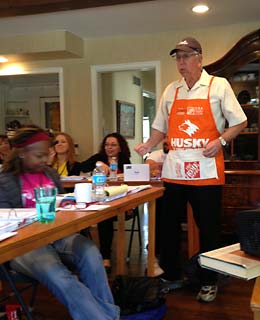
Woody, in one of his training costumes, demonstrating his strategic tool box model to resolve conflict.
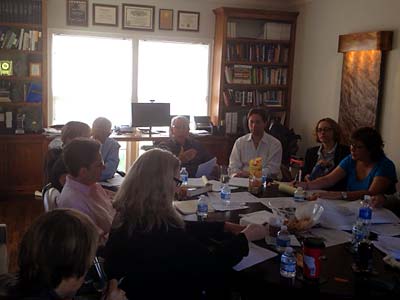 Training Courses for Mediators
Training Courses for Mediators
Woody Mosten is dedicated to providing quality interdisciplinary training for Mediators on all levels. In addition to covering the basic and advanced skills, our curriculum incorporates peacemaking values and family centered strategies into all of its courses as well as planning and tips for you to successfully build your practice.
You can unbundle your training experience by taking just one course or make a commitment to complete most or all of our trainings.
We offer the following courses in San Diego, California or customized to be presented in your community.
Jan 2020 Basic Divorce Mediation Training
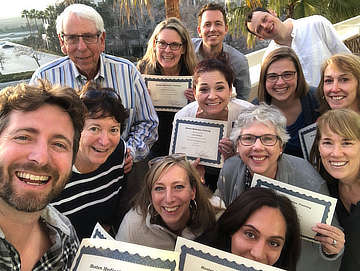
40 Hour Basic Family Mediation Training
 With Dr. Mary Lund Presenting on Parenting Plans and High Conflict Families
With Dr. Mary Lund Presenting on Parenting Plans and High Conflict Families
This uniquely designed training is a favorite for both beginners and experienced mediators, as well as lawyers, mental health, and financial professionals alike. In addition to a solid overview of skills and concepts based on cutting edge scholarship in the field, this training offers the following customized features:
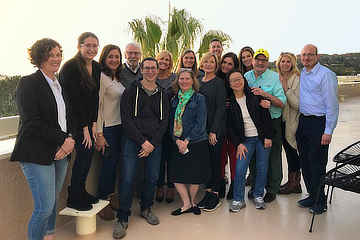
February 2019 40 Hour Divorce Mediation Training Participants at Pacific Coast Mediation Center in San Diego. Assistant Trainer was Lara Traum from New York with guest appearance on Zoom by Bea Larsen from Cincinnati. Peacemakers journeyed to training from Oregon, Pennsylvania and Northern California.
- Effective Telephone Intake and Orientation Model
- Private Preliminary Planning Sessions for Each Party (PPP)
- How to Work with Lawyers and Experts in the Room
- Building a Private Family Mediation Practice
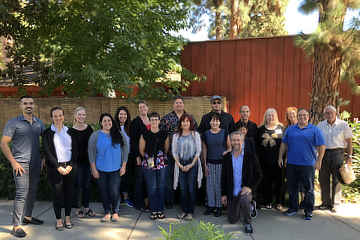
October 2018 Mediation Course with Lawyers and Mental Health Professionals from Delaware, Oregon, and all over California.
Each participant will conclude course with a three-hour mediation integrating seven financial issues. Every participant is given direct feedback by a professional mediator who observes the entire simulation.
Course Participants receive a 350 page custom manual that has evolved to remain current since Woody’s first basic family mediation training in 1987. Portions of his books Complete Guide to Mediation, 2nd Edition (with Elizabeth Potter Scully, 2015) and Mediation Career Guide are provided
Approved for 37.5 Hours of California MCLE and Family Specialization and 40 Hours for California Social Workers and Marriage and Family Therapists and is approved in other states upon request.
Mosten Mediation and Collaborative Training is an Approved Continuing Education Provider for Attorneys by the California State Bar MCLE & Family Law Specialization, and for Social Workers and Marriage Family Therapists through California Association of Marriage and Family Therapists (CAMFT)
Mosten Mediation Training's 40 Hr. Basic Divorce Mediation Training has been approved by California's MC3 Mediator Certification Program as follows:
MC3 has approved the following mediation courses as satisfying its requirement for a program that covers the basics in how to conduct mediation. Applicants satisfactorily completing these courses may use their completion certificate alone as proof of having completed this requirement when applying for MC3 Certification.
Click for Participants’ comments about this course.
Advanced Family Mediation Training
 With Susan Guthrie (www.divorceinabetterway.com)
With Susan Guthrie (www.divorceinabetterway.com)
This 2 day course is designed for mediators who have minimum training of a basic family mediation course (30 hours).
The content of this course builds on our basic Family Training and offers the following cutting edge features:
- Mediator as designer of process
- Mediator’s Role in Educating About Use of Lawyers
- Informed consent as foundation for party decision making
- Management of High Conflict Issues and Complex Party Dynamics
- Co-Mediation
- Mediation as part of the Litigation Case
- Use of Confidential Mini-Evaluations
- Drafting Interim Agreements and Court Orders
- Mediator Settlement Proposals
- Preventive Mediations of Cohabitation, Premarital, and Postmarital Agreements and Other Family Relationships
- Nuanced Use of Mediator’s Advanced Tool-box
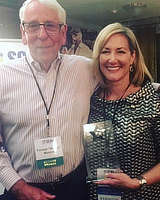
Click for Participants’ comments about this course.
Unbundling Legal Services and Interdisciplinary Limited Scope Client Coaching
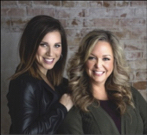 With Amy Skogerson and Andrea McGinn (Des Moines, IA)
With Amy Skogerson and Andrea McGinn (Des Moines, IA)
This two day training is designed for family law attorneys, judicial officers and legal professionals, and is open to other family professionals who are interested in learning about unbundling legal services and how to coach unrepresented clients and mediation participants. We will show how you handle the nuts and bolts of this limited scope legal service, design your practice to efficiently represent unbundling clients, and expand your practice by increasing legal access to the underserved.
Participants in this two-day training program will learn:
- The impact of self-represented persons on the family law system
- How unbundling (limited scope representation) meets the legal need gap
- Why offering unbundled services can grow your practice
- The protocols and skills to offer effective client consultations
- Defining the scope of representation and using special client engagement agreements
- Monitoring and modifying the scope of representation
- Converting from limited scope to full service representation
- How to ghostwrite letters and court documents
- Provide negotiation and mediation coaching via limited scope representation
- How to terminate an unbundled relationship
- Avoiding ethical traps of unbundling
- Utilizing best practices of limited scope lawyering
- How replicable models of unbundling are succeeding in the marketplace
- Using unbundling to reduce family conflict
Texts for this course shall include Mosten-Scully, Unbundled Legal Services (ABA, 2017) and Julie MacFarlane, The New Lawyer, 2nd Edition (2017)
Click for Participants’ comments about this course.
Training Agenda:
Friday, February 21, 2020
8:30 — Registration
9:00 — Welcome: Goals and Overview for this Training
9:15 — Introductions of Participants
9:30 — The Self-Representation Revolution: Overview of Consumer Oriented Method of Lawyering and History and Foundation of Unbundling
10:30 - BREAK
10:45 — Unbundled Lawyering Roles in Family Law
12:30 — LUNCH
1:30 — Intake; Initial Consultation, Screening; Simulation and Feedback
2:45 — BREAK
3:00 — Contracting — Ethical Issues and Best Practices
4:00 — Group Wrap-Up Discussion
4:30 — End of Training Day 1
Saturday, February 22, 2020
8:30 — Registration
9:00 — Lessons from Day 1
9:30 — Monitoring and Modifying the Scope of the Unbundling Relationship
10:00 — Simulation Discussion with Client to Modify Scope of Representation
10:30 - BREAK
10:45 — Making Your Office a Classroom of Client Education
11:00 — Terminating the Unbundling Relationship, Simulation and Discussion
12:00 — Successful Replicable Models of Unbundling in Private Practice, Courts, and Non-Profits
12:30 — LUNCH
1:30 — Unbundled Coaching for Participants in Mediation
2:15 — Simulation of Limited Scope Lawyer Role at Mediation Session
3:00 — BREAK
3:15 — Unbundling a Collaborative Practice; Next Steps to Reshaping Your Practice to Unbundle
4:30 — End of Training Day 2
Unbundled Legal Services: The Win-Win-Win Model for Improving Access to Legal Services
September 5, 2018
By William Hornsby
The Law Office of William Hornsby
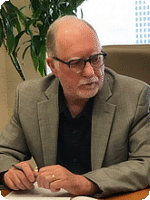 Unbundling has been a tool to better deliver legal services since the 1990s, when California family law practitioner Forrest “Woody” Mosten coined the term and became its alpha advocate. Woody brought this model to both the American Bar Association Standing Committee on the Delivery of Legal Services (Delivery Committee) as a committee member and IAALS as an advisor. Since then, both IAALS and the Delivery Committee have conducted research on aspects of unbundling; advanced the conversation within the legal services ecosystem through publications, conference panels, and a resource center; and developed recommendations and policies that enable lawyers to provide affordable legal services to those of low and moderate incomes through this model.
Unbundling has been a tool to better deliver legal services since the 1990s, when California family law practitioner Forrest “Woody” Mosten coined the term and became its alpha advocate. Woody brought this model to both the American Bar Association Standing Committee on the Delivery of Legal Services (Delivery Committee) as a committee member and IAALS as an advisor. Since then, both IAALS and the Delivery Committee have conducted research on aspects of unbundling; advanced the conversation within the legal services ecosystem through publications, conference panels, and a resource center; and developed recommendations and policies that enable lawyers to provide affordable legal services to those of low and moderate incomes through this model.
In early 2017, IAALS and the Delivery Committee began a collaboration to host a conference on this issue to occur later that same year—a conference that could take unbundling to the next level. Their joint conference, Better Access through Unbundling: From Ideation to Implementation, was designed to bring together bar leaders, practitioners, judges, court personnel, technologists, librarians, legal educators, legal aid lawyers, and access advocates from all of these stakeholders around the United States and Canada. Their purpose was to share developments on research, policies, outreach models, and technologies, and then to brainstorm new paths for greater implementation of unbundled legal services, and consequently increase access to affordable services for those of low and moderate incomes. Together, we created a coordinating committee of experts to oversee the planning, shared staffing obligations, and ultimately brought together nearly 100 people in October 2017 at the University of Denver to share their thoughts and insights from the panoply of perspectives.
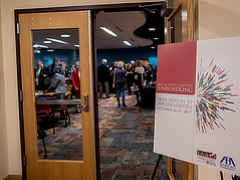 The front end of the conference was dedicated to sharing information. Natalie Knowlton, from IAALS, and Sara Smith, from the ABA, shared recent research on the consumer’s perspective, demonstrating the need for affordable services for pro se litigants, and the lawyer’s perspective, where we saw that unbundling is a mile wide and an inch deep, with about 300,000 lawyers providing unbundled services, but the vast majority doing so in less than 20 percent of their cases. We heard about the status of state-based policies that enable lawyers to provide unbundled services in compliance with ethics and procedural rules, and the need for more changes in this arena. Those from states providing innovative outreach, such as Colorado, reported on their best practice models. A particularly impactful panel showcased practitioners who are unbundling their services in various methods and for various client demographics.
The front end of the conference was dedicated to sharing information. Natalie Knowlton, from IAALS, and Sara Smith, from the ABA, shared recent research on the consumer’s perspective, demonstrating the need for affordable services for pro se litigants, and the lawyer’s perspective, where we saw that unbundling is a mile wide and an inch deep, with about 300,000 lawyers providing unbundled services, but the vast majority doing so in less than 20 percent of their cases. We heard about the status of state-based policies that enable lawyers to provide unbundled services in compliance with ethics and procedural rules, and the need for more changes in this arena. Those from states providing innovative outreach, such as Colorado, reported on their best practice models. A particularly impactful panel showcased practitioners who are unbundling their services in various methods and for various client demographics.
During the second part of the conference, attendees were asked to find their communities and break up into groups based on whether their states and provinces were crawling, walking, or running—our way of describing jurisdictions who are either just wading into the unbundling waters or who have been doing so for a longer time. The task of each group was to share ideas that could become the core of statewide strategic plans to enhance the implementation of unbundled services. In this respect, our effort was to make this a living conference—something that would continue to provide direction and influence change well after its conclusion. Thanks to an excellent conference report by Natalie Knowlton, the results of these discussions are detailed with specific directions and recommendations to make unbundling an even more significant way to advance affordable access to legal services.
While it is essential for institutions such as the IAALS and the ABA to continue their support for this delivery model, now is the time for state and provincial jurisdictions to bring their stakeholders together, solidify their strategic plans, and dedicate their resources to the advancement of unbundling. We need to recognize that unbundling is the only delivery mechanism that benefits lawyers, through a model of full compensation, benefits consumers by providing a level of service that is gauged to meet their needs at an affordable price, and benefits the courts by having prepared and knowledgeable litigants who would otherwise be pro se and unfamiliar with the judicial process. In short, unbundled legal services is a win-win-win model for improving access to affordable legal services.
This article and other information on unbundling legal services can be found here
Building a Successful (and Profitable) Collaborative and Mediation Practice
With Trainers Ron Ousky (Minneapolis, MN, former IACP President and author), Stu Webb (Collaborative Way to Divorce) and Gary Direnfeld (Keswick, Ontario, creator of www.yoursocialworker.com).
This two day training is designed for family law attorneys, judicial officers and legal professionals, and is open to other family professionals who are interested in learning about unbundling legal services and how to coach unrepresented clients and mediation participants. We will show how you handle the nuts and bolts of this limited scope legal service, design your practice to efficiently represent unbundling clients, and expand your practice by increasing legal access to the underserved.
Participants in this two-day training program will learn:
- The impact of self-represented persons on the family law system
- How unbundling (limited scope representation) meets the legal need gap
- Why offering unbundled services can grow your practice
- The protocols and skills to offer effective client consultations
- Defining the scope of representation and using special client engagement agreements
- Monitoring and modifying the scope of representation
- Converting from limited scope to full service representation
- How to ghostwrite letters and court documents
- Provide negotiation and mediation coaching via limited scope representation
- How to terminate an unbundled relationship
- Avoiding ethical traps of unbundling
- Utilizing best practices of limited scope lawyering
- How replicable models of unbundling are succeeding in the marketplace
- Using unbundling to reduce family conflict
Texts for this course shall include Mosten-Scully, Unbundled Legal Services (ABA, 2017) and Julie MacFarlane, The New Lawyer, 2nd Edition (2017)
Click for Participants’ comments about this course.
Basic Interdisciplinary Collaborative Training
We do not offer this course. Rather, we suggest that you enroll in a course offered by a local Collaborative Practice group or others throughout the country. If you wish to obtain this course in Southern California, we recommend the course offered by the Collaborative Family Law Group of San Diego or Los Angeles Collaborative Family Law Association.
Advanced Collaborative Training
Regardless of which Collaborative Training you have completed, this 2 day training is an essential building block for you to become a competent Collaborative Practice Professional. Woody will highlight the following in this training:
- Refining your client intake to increase potential clients coming to see you and signing up
- Expanding the models of Collaborative Practice that you offer to potential clients
- Concrete strategies to enroll the other spouse and counsel in the Collaborative Process
- Effective teambuilding and communication with other collaborative professionals
- Advanced negotiation models and strategies for joint Collaborative Meetings
- Dealing effectively with suspension and termination of the Collaborative Process
Click for Participants’ comments about this course.
Effective Interdisciplinary Teamwork with Dr. Constance Ahrons presenting on Co-Mediation

Dr. Constance Ahrons

Kathleen Zumprano, MA
This training focuses on the how teams can be effective for families in mediation and collaborative practice. Participants will learn the foundations for forming a team and implementing teamwork based on successful team models from other fields and practical experience in the family field.
The first day will concentrate on interdisciplinary co-mediation and assembling a team of lawyers, mental health and financial professionals and working with that team inside and outside of mediation sessions. Use of the disqualification clause for the interdisciplinary team members will be discussed. Dr. Ahrons and Woody Mosten have co-mediated together as an interdisciplinary team and will demonstrate their co-mediation model during afternoon of the first day. Dr, Ahrons practices in La Jolla, California and is the author of the seminal books, The Good Divorce and We’re Still Family.
The second day will focus on effective teamwork in collaborative practice. Forming teams with clients, between lawyers, and with mental health coaches, child specialists, neutral financial professionals, clergy, and other team members. Particular attention will be devoted to conducting productive team meetings and communication within joint sessions. Kathleen Zumprano will be presenting. Ms. Zumprano practices in Vancouver, Washington and has extensive experience in the practice and training of interdisciplinary teams and is the author of Collaborative Child Specialists in Mosten and Cordover, Building a Successful Collaborative Practice (2018).
Texts for the course will be: Mosten and Cordover, Building a Successful Collaborative Practice, Family Court Review Special Issue on Interdisciplinary Teams (July, 2018), and other relevant articles and practice forms.
Interest Based Negotiation Strategies
Negotiation is often seen solely as dependent on the use of power and leverage.
Based on overwhelming research and the best seller Getting to Yes, this workshop will go beyond traditional adversarial negotiation styles and focus on the concept of mutual problem solving.
Participants will learn and practice templates that can be used in negotiations in both litigation and non-litigation family and business relationships. These skills can be used in negotiations in many contexts as well as in the mediation room.
Finally, you will learn how to use positive self- interest to take apparently intractable conflicts to convert discussions to option generation and testing positions.
This is a workshop for mediators, lawyers, mental health, financial, and other professionals.
Collaborative Professionals and Mediators as Peacemakers:
A Master Class Retreat
With Woody Mosten and David Hoffman, Trainers
This interactive retreat in sunny San Diego may be a perfect way for you to launch a new decade!
Woody Mosten and David Hoffman have trained professionals together in Boston, Philadelphia, Chicago, and at IACP Conferences. Their mutual respect and synergy hopefully provide a useful model for your team interactions in your own cases.
David’s Ted Talk on “Lawyer as Peacemaker,” keynotes of IACP and elsewhere, and his book, “Bringing Peace Into the Room” (with Daniel Bowling) are groundbreaking. Woody’s seminal article, “Lawyer as Peacemaker,” his peacemaking course at UCLA School of Law, the 2018 Peace Institute sponsored by the Pennsylvania State Bar, and Family Court Review’s special issue on peacemaking (which Woody edited) all will be lead-ups to this retreat. David will be with us on January 11 only, and Woody on both days.
Woody and David will structure the two days as follows:
- Defining Peacemaking and Surveying Its Developments and Use in Other Fields
- Assessing How Peacemaking Exists (or Should) in Mediation and Collaborative Practice
- Building Your Individual Peacemaking Signature
- Infusing Peacemaking and Prevention of Conflict into our Current Cases
- Examining the Internal Psychological Work of Peacemaking – For Ourselves and Our Clients
- Utilizing Spiritual Practice in High-Conflict Dynamics
- Visioning the Future of Peacemaking in Our Work and Personal Lives
Every participant will be offered the opportunity (but not required) to present a brief module on their own vision of peacemaking to the other participants.
Customized Individual Study and Case Consultation (Mediation Skills)
This training may be completed in person or via Zoom. After a 1 hour consultation, you will design your own program based on your skill level and knowledge of conflict resolution literature.
Customized Individual Practice Consultation (Practice Building Strategies)
This training may be completed in person or via Zoom. After a 1 hour consultation, you will design your own program based on your current profitability and satisfaction of your practice.
Click for Participants’ comments about this course, click on
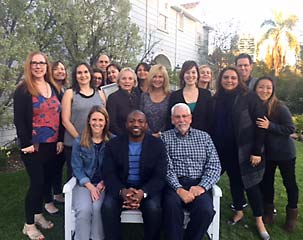 January 2017
January 2017
Surrounding the bench on Woody’s front lawn to which the participants “baby stepped” on Day 2 of the Training. (In front of the bench stands a sign, “Please Sit and Enjoy.”
Seven Collaborative Professionals from Vancouver, Washington attended the training. Seated with Woody is Jason Harper, Assistant Trainer from Los Angeles who is also the President of the Southern California Mediation Association
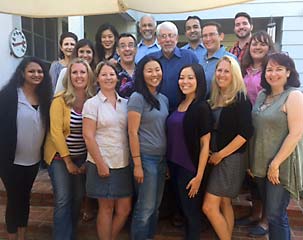 September 2016
September 2016
Nationwide participants join Woody and Adam Cordover, Assistant Trainer from Tampa, Florida.
Adam is co-author with Woody on the ABA book, Building a Successful Collaborative Practice forthcoming in 2017
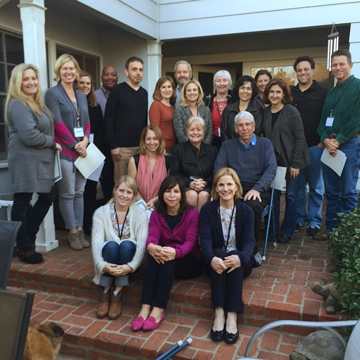 January 2015
January 2015
The proud graduating class shows their certificates after the Circle Closing Ceremony with each training participant using a Native American talking stick.
Seated: Woody and Sandra Crawford, Assistant Trainer who is a Collaborative Lawyer and Mediator from Chicago, Illinois.
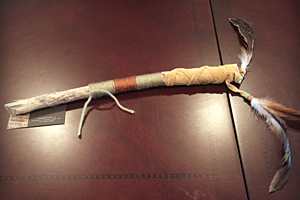
September 2014
The proud graduating class shows their certificates after the Quaker Circle Closing Ceremony.
Seated: Woody and Enid Miller Ponn, Assistant Trainer who is a Mediator and Collaborative Lawyer from Weston, Florida.
|
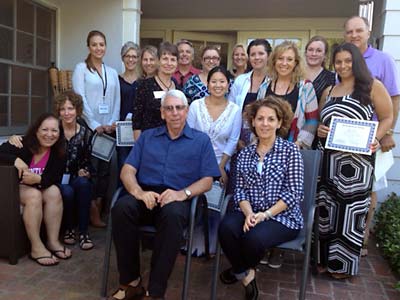 |
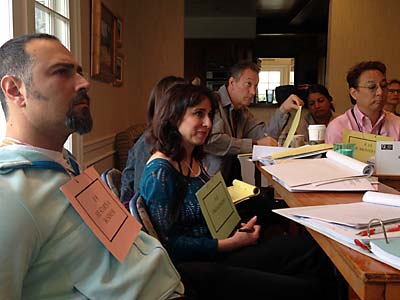 |
January 2014
Participants in 2014 Divorce Mediation Training interactively learn 14 ways to handle date of separation for property and support issues in mediation.
|
January 2014
Smiling Graduates with their certificates and CLE Credit! Seated with Woody are Gwen Mathewson, Assistant Trainer (Seattle), Dr. Jody Mosten, and Jazz Mosten, a Katrina rescue dog with over 600 hours of mediation training!
|
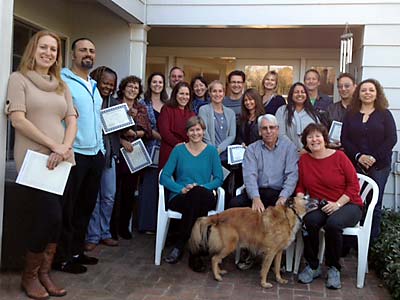 |
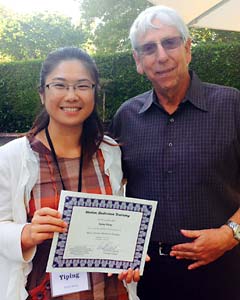 |
September 2013
Yiping Wang, who has studied mediation in China and Japan and currently is on the staff of the Asian Pacific Dispute Resolution Center in Los Angeles, receives her certificate of completion of the 40 Hr Basic Divorce Mediation Training.
In a small world story, Yiping’s graduate school faculty advisor at Kyoto University, Professor Aya Yamada, was the host for Mr, Mosten’s mediation trainings in Kyoto and Tokyo in 2005. Yiping and Woody discovered this connection over lunch on the first day of the training during which the training participants and trainers eat together outside in the California sunshine. Yiping immediately emailed Professor Yamada who sent her greetings!
|
January 2013
Basic Divorce Training Closing Ceremony to which family and friends are invited.
|
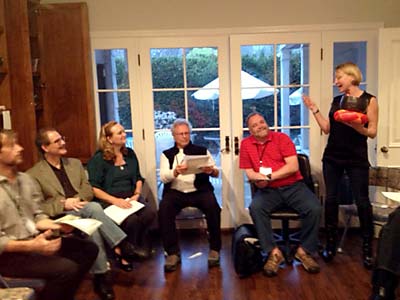 |
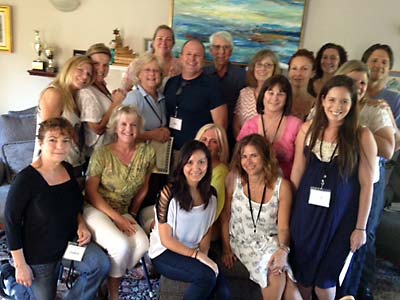 |
September 2012
40-Hour
Basic Mediation
Course Graduates
|
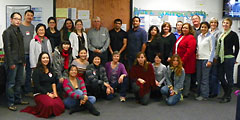 |
Woody Mosten with participants of his 2012 Basic 3 Day Mediation Course sponsored by the Asian Pacific American Dispute Resolution Center in Los Angeles. Woody offers mediation and dispute resolution training for many non-profit organizations such as the Hopi Indian Tribe, Private Elementary and Upper Schools, and Governmental Agencies.
|
Basic Divorce Training Graduates say goodbye after receiving their certificates.
Many Mosten Mediation Training graduates stay in touch through email groups and Woody's monthly training groups.
|
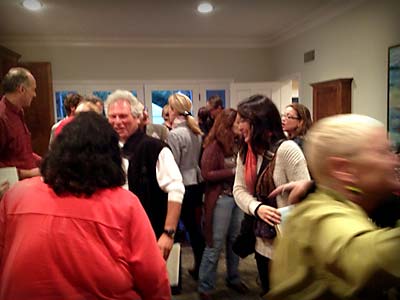 |
Training Courses for Collaborative Professionals
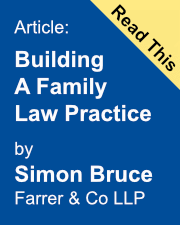
Woody Mosten is dedicated to providing quality interdisciplinary training for Collaborative Practitioners and Mediators on all levels. In addition to covering the basic and advanced skills, our curriculum incorporates peacemaking values and family centered strategies into all of our courses as well as planning and tips for you to successfully build your practice.
You can unbundle your training experience by taking just one course or make a commitment to complete most or all of our trainings.
We offer the following courses in San Diego, California or customized for your community. All courses limit attendance to 15 participants except Master Classes which are limited to 8 participants
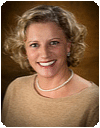 In 2020, I had the pleasure to organize an Advanced Collaborative Training with Woody Mosten for the Utah Association of Collaborative Professionals. Since that training, the amount of Collaborative Cases I have has at least tripled, and many other peacemakers in our Collaborative Group are reporting a similar surge in their Collaborative case load. Woody’s passion and hands-on teaching inspired every participant on the Zoom screen and has infused an energy in Utah that has helped us work on legislative and judicial changes to support and promote Collaborative Practice.
In 2020, I had the pleasure to organize an Advanced Collaborative Training with Woody Mosten for the Utah Association of Collaborative Professionals. Since that training, the amount of Collaborative Cases I have has at least tripled, and many other peacemakers in our Collaborative Group are reporting a similar surge in their Collaborative case load. Woody’s passion and hands-on teaching inspired every participant on the Zoom screen and has infused an energy in Utah that has helped us work on legislative and judicial changes to support and promote Collaborative Practice.
Anne A. Cameron, Collaborative Lawyer and Mediator
Park City, UT
www.UtahCollabDivorce.com
Advanced Collaborative Training
Regardless of which Collaborative Training you have completed, this 2 day training is an essential building block for you to become a competent Collaborative Practice Professional. Woody will highlight the following in this training:
- Refining your client intake to increase potential clients coming to see you and signing up
- Expanding the models of Collaborative Practice that you offer to potential clients
- Concrete strategies to enroll the other spouse and counsel in the Collaborative Process
- Effective teambuilding and communication with other collaborative professionals
- Advanced negotiation models and strategies for joint Collaborative Meetings
- Dealing effectively with suspension and termination of the Collaborative Process
Click for Participants’ comments about this course.
Basic Interdisciplinary Collaborative Training
We do not offer this course. Rather, we suggest that you enroll in a course offered by a local Collaborative Practice group or others throughout the country. If you wish to obtain this course in Southern California, we recommend the course offered by the Collaborative Family Law Group of San Diego or Los Angeles Collaborative Family Law Association.
Family Peacemaking (Overview of Aligned Client Processes)
This two day course is an intensive, interdisciplinary, three-day study course for attorneys, mental health and financial professionals. The course will cover:
- Learn concepts, values and perspectives of peacemaking, collaborative law, limited scope representation and preventative legal services;
- Discuss the implications for confidentiality and preventive family professional services, and survey developments in conflict resolution and interdisciplinary teamwork;
- Practice skills involved in these basic concepts;
- Explore alternative role models and possible career opportunities in peacemaking, conflict resolution and interdisciplinary teamwork.
Materials for this course include David Hoffman’s Ted Talk on Lawyer as Peacemaker, Be a Peacemaker (Chapter from Mosten-Scully, Complete Guide to Mediation) and other materials from Woody’s Peace Institute sponsored by the Pennsylvania Bar Association.
Click for Participants’ comments about this course.
Building a Successful (and Profitable) Collaborative and Mediation Practice
With Trainers Ron Ousky (Minneapolis, MN, former IACP President and author), Stu Webb (Collaborative Way to Divorce) and Gary Direnfeld (Keswick, Ontario, creator of www.yoursocialworker.com).
This two day training is designed for family law attorneys, judicial officers and legal professionals, and is open to other family professionals who are interested in learning about unbundling legal services and how to coach unrepresented clients and mediation participants. We will show how you handle the nuts and bolts of this limited scope legal service, design your practice to efficiently represent unbundling clients, and expand your practice by increasing legal access to the underserved.
Participants in this two-day training program will learn:
- The impact of self-represented persons on the family law system
- How unbundling (limited scope representation) meets the legal need gap
- Why offering unbundled services can grow your practice
- The protocols and skills to offer effective client consultations
- Defining the scope of representation and using special client engagement agreements
- Monitoring and modifying the scope of representation
- Converting from limited scope to full service representation
- How to ghostwrite letters and court documents
- Provide negotiation and mediation coaching via limited scope representation
- How to terminate an unbundled relationship
- Avoiding ethical traps of unbundling
- Utilizing best practices of limited scope lawyering
- How replicable models of unbundling are succeeding in the marketplace
- Using unbundling to reduce family conflict
Texts for this course shall include Mosten-Scully, Unbundled Legal Services (ABA, 2017) and Julie MacFarlane, The New Lawyer, 2nd Edition (2017)
Click for Participants’ comments about this course.
Building a Successful Unbundled Family Law Practice and Interdisciplinary Limited Scope Coaching with Judge Mark Juhas, Guest Presenter
This two-day workshop has been designed for Collaborative Professionals and Mediators with a variety of backgrounds ( lawyers, mental health, financial and other professionals, businesspersons, and clergy) who have private practices or wish to open up their own practice. The course employs a cutting edge interactive curriculum to help participants grow their dispute resolution practices and increase their financial profitability as mediators, negotiators and mediation advocates, working in interdisciplinary teams, and how to market and manage your practice.
Texts for this course shall include Mosten-Cordover, Building a Successful Collaborative Practice (ABA, 2018) Mosten and Mediation Career Guide (Wiley, 2009)
Click for Participants’ comments about this course.
Building a Collaborative & Mediation Practice
Forrest (Woody) Mosten
NUI, Maynooth – 13th and 14th April 2012
Forrest (Woody) Mosten delivered a 2 day conference entitled “Building a Collaborative and Mediation Practice” at the Renehan Hall in the beautiful grounds of the National University of Ireland, Maynooth on Friday 13th and Saturday 14th April 2012.
The Conference was a powerhouse of inspiration and hope and delivered much, much more than the title suggests. There was a good mix of students from legal, mediation and therapeutic backgrounds.
I previously had the benefit of Woody’s great teaching in his 5 day Family Law Mediation Course in Los Angeles in September 2011 and I was looking forward with anticipation to experiencing more Woody magic!
Woody immediately challenged us to expand our vision with the concept that we can deliver our peacekeeping services in all aspects of our working lives and encouraged us to develop a flexible approach to dispute resolution shaped by the needs of our clients.
He further developed our thinking by describing the range of services he provides to his clients. These services range from one off, stand alone transactions delivered at any point in any process, to providing services for the full process. This unbundling of services and consequent additional income means it can create is certainly welcome news to us hard pressed lawyers in recession hit Ireland.
Woody showed us that peacemaking comes in many different packages and that it is not necessarily constrained or limited by any particular label provided it is done with informed consent, is transparent and the Participation Agreement is signed in Collaborative Practice. It became apparent to us that the fact that Woody practices only outside of Court clearly allows him a great deal of freedom and flexibility in the provision of his services.
It was a joy to watch and listen to Woody’s seemingly effortless practice of conflict management techniques.
He truly is a master of his craft!
Helen M. Collins
Wolfe & Co. Solicitors
Market Street, Skibbereen, Co. Cork
40 Hour Basic Family Mediation Training
With Lynn Waldman (San Diego, CA) Presenting on Parenting Plans and High Conflict Families and Meegan Reis, Assistant Trainer (Portsmouth, NH)

October 2018 Mediation Course with Lawyers and Mental Health Professionals from Delaware, Oregon, and all over California.
This uniquely designed training is a favorite for both beginners and experienced mediators, as well as lawyers, mental health, and financial professionals alike. In addition to a solid overview of skills and concepts based on cutting edge scholarship in the field, this training offers the following customized features:
- Effective Telephone Intake and Orientation Model
- Private Preliminary Planning Sessions for Each Party (PPP)
- How to Work with Lawyers and Experts in the Room
- Building a Private Family Mediation Practice
Each participant will conclude course with a three-hour mediation integrating seven financial issues. Every participant is given direct feedback by a professional mediator who observes the entire simulation.
Course Participants receive a 350 page custom manual that has evolved to remain current since Woody’s first basic family mediation training in 1987. Complete Guide to Mediation, 2nd Edition (with Elizabeth Potter Scully, 2015) and Mediation Career Guide are recommended to be read before the course.
Approved for 37.5 Hours of California MCLE and Family Specialization and 40 Hours for California Social Workers and Marriage and Family Therapists and is approved in other states upon request.
Click for Participants’ comments about this course.
Advanced Family Mediation Training
This 2 day course is designed for mediators who have minimum training of a basic family mediation course (30 hours).
The content of this course builds on our basic Family Training and offers the following cutting edge features:
- Mediator as designer of process
- Mediator’s Role in Educating About Use of Lawyers including y
- Informed consent as foundation for party decision making
- Management of High Conflict Issues and Complex Party Dynamics
- Co-Mediation
- Mediation as part of the Litigation Case
- Use of Confidential Mini-Evaluations
- Drafting Interim Agreements and Court Orders
- Mediator Settlement Proposals
- Preventive Mediations of Cohabitation, Premarital, and Postmarital Agreements and Other Family Relationships
- Nuanced Use of Mediator’s Advanced Tool-box
Click for Participants’ comments about this course.
Unbundling Legal Services and Interdisciplinary Limited Scope Client Coaching
This two day training is designed for family law attorneys, judicial officers and legal professionals, and is open to other family professionals who are interested in learning about unbundling legal services and how to coach unrepresented clients and mediation participants. We will show how you handle the nuts and bolts of this limited scope legal service, design your practice to efficiently represent unbundling clients, and expand your practice by increasing legal access to the underserved.
Participants in this two-day training program will learn:
- The impact of self-represented persons on the family law system
- How unbundling (limited scope representation) meets the legal need gap
- Why offering unbundled services can grow your practice
- The protocols and skills to offer effective client consultations
- Defining the scope of representation and using special client engagement agreements
- Monitoring and modifying the scope of representation
- Converting from limited scope to full service representation
- How to ghostwrite letters and court documents
- Provide negotiation and mediation coaching via limited scope representation
- How to terminate an unbundled relationship
- Avoiding ethical traps of unbundling
- Utilizing best practices of limited scope lawyering
- How replicable models of unbundling are succeeding in the marketplace
- Using unbundling to reduce family conflict
Texts for this course shall include Mosten-Scully, Unbundled Legal Services (ABA, 2017) and Julie MacFarlane, The New Lawyer, 2nd Edition (2017)
Click for Participants’ comments about this course.
Effective Interdisciplinary Teamwork
This training focuses on the how teams can be effective for families in mediation and collaborative practice. Participants will learn the foundations for forming a team and implementing teamwork based on successful team models from other fields and practical experience in the family field.
The first day will concentrate on interdisciplinary co-mediation and assembling a team of lawyers, mental health and financial professionals and working with that team inside and outside of mediation sessions. Use of the disqualification clause for the team members will be demonstrated.
The second day will focus on effective teamwork in collaborative practice. Forming teams with clients, between lawyers, and with mental health coaches, child specialists, neutral financial professionals, clergy, and other team members. Particular attention will be devoted to conducting productive team meetings and communication within joint sessions.
Texts for the course will be: Mosten and Cordover, Building a Successful Collaborative Practice, Family Court Review Special Issue on Interdisciplinary Teams (July, 2018), and other relevant articles and practice forms.
Collaboratively Representing Clients in Mediation and in Pre-Marital Agreements
This training is for mediators, lawyers, and other collaborative professionals who want to maximize client centered decision making in mediation and in building pre-marital agreements. Many family lawyers treat mediation as the next step of the litigation process and import adversarial negotiations into mediation rather than as a safe impartial container to resolve all disputed issues. This course will show how the disqualification clause can be successfully used by mediators and lawyers to reduce the chance of premature termination when the going gets tough.
Woody will take participants step by step through the introduction of the use of a collaborative team into the mediation process, negotiation of the disqualification agreement with parties and lawyers, how lawyers can work outside sessions or attend sessions with their clients and how the disqualification clause takes effect upon termination of mediation.
On the second day of this training, participants will journey into a collaborative team approach of negotiating premarital agreements. Instead of presenting oppressive drafts to a less powerful fiancée, you will learn how to conduct joint meetings with fiancees and the collaborative team (often including mental and financial professionals) to produce a jointly drafted agreement based on the shared values and marital vision of the couple regarding financial roles, accumulation of assets, and spousal support should the parties ever separate. You will also learn how to build in collaborative protocol for modification and implementation of the agreements made by the parties.
Texts: Mosten and Scully, Complete Guide to Mediation and other customize forms and client materials.
Collaborative Professionals and Mediators as Peacemakers:
A Master Class Retreat
With Woody Mosten and David Hoffman, Trainers
This interactive retreat in sunny San Diego may be a perfect way for you to launch a new decade!
Woody Mosten and David Hoffman have trained professionals together in Boston, Philadelphia, Chicago, and at IACP Conferences. Their mutual respect and synergy hopefully provide a useful model for your team interactions in your own cases.
David’s Ted Talk on “Lawyer as Peacemaker,” keynotes of IACP and elsewhere, and his book, “Bringing Peace Into the Room” (with Daniel Bowling) are groundbreaking. Woody’s seminal article, “Lawyer as Peacemaker,” his peacemaking course at UCLA School of Law, the 2018 Peace Institute sponsored by the Pennsylvania State Bar, and Family Court Review’s special issue on peacemaking (which Woody edited) all will be lead-ups to this retreat. David will be with us on January 11 only, and Woody on both days.
Woody and David will structure the two days as follows:
- Defining Peacemaking and Surveying Its Developments and Use in Other Fields
- Assessing How Peacemaking Exists (or Should) in Mediation and Collaborative Practice
- Building Your Individual Peacemaking Signature
- Infusing Peacemaking and Prevention of Conflict into our Current Cases
- Examining the Internal Psychological Work of Peacemaking – For Ourselves and Our Clients
- Utilizing Spiritual Practice in High-Conflict Dynamics
- Visioning the Future of Peacemaking in Our Work and Personal Lives
Every participant will be offered the opportunity (but not required) to present a brief module on their own vision of peacemaking to the other participants.
Customized Individual Study and Case Consultation
This training may be completed in person or via Zoom. After a 1 hour consultation via , you will design your own program based on your skill level and knowledge of interdisciplinary collaborative literature.
Customized Individual Practice Consultation (Collaborative Practice Building Strategies)
This training may be completed in person or via Zoom. After a 1 hour consultation, you will design your own program based on your current profitability and satisfaction of your practice.
Click for Participants’ comments about this course.


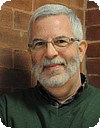



 Training Courses for Mediators
Training Courses for Mediators
 With Dr. Mary Lund Presenting on Parenting Plans and High Conflict Families
With Dr. Mary Lund Presenting on Parenting Plans and High Conflict Families

 With Susan Guthrie (
With Susan Guthrie (
 With Amy Skogerson and Andrea McGinn (Des Moines, IA)
With Amy Skogerson and Andrea McGinn (Des Moines, IA) Unbundling has been a tool to better deliver legal services since the 1990s, when California family law practitioner Forrest “Woody” Mosten coined the term and became its alpha advocate. Woody brought this model to both the American Bar Association Standing Committee on the Delivery of Legal Services (Delivery Committee) as a committee member and IAALS as an advisor. Since then, both IAALS and the Delivery Committee have conducted research on aspects of unbundling; advanced the conversation within the legal services ecosystem through publications, conference panels, and a resource center; and developed recommendations and policies that enable lawyers to provide affordable legal services to those of low and moderate incomes through this model.
Unbundling has been a tool to better deliver legal services since the 1990s, when California family law practitioner Forrest “Woody” Mosten coined the term and became its alpha advocate. Woody brought this model to both the American Bar Association Standing Committee on the Delivery of Legal Services (Delivery Committee) as a committee member and IAALS as an advisor. Since then, both IAALS and the Delivery Committee have conducted research on aspects of unbundling; advanced the conversation within the legal services ecosystem through publications, conference panels, and a resource center; and developed recommendations and policies that enable lawyers to provide affordable legal services to those of low and moderate incomes through this model.  The front end of the conference was dedicated to sharing information. Natalie Knowlton, from IAALS, and Sara Smith, from the ABA, shared recent research on the consumer’s perspective, demonstrating the need for affordable services for pro se litigants, and the lawyer’s perspective, where we saw that unbundling is a mile wide and an inch deep, with about 300,000 lawyers providing unbundled services, but the vast majority doing so in less than 20 percent of their cases. We heard about the status of state-based policies that enable lawyers to provide unbundled services in compliance with ethics and procedural rules, and the need for more changes in this arena. Those from states providing innovative outreach, such as Colorado, reported on their best practice models. A particularly impactful panel showcased practitioners who are unbundling their services in various methods and for various client demographics.
The front end of the conference was dedicated to sharing information. Natalie Knowlton, from IAALS, and Sara Smith, from the ABA, shared recent research on the consumer’s perspective, demonstrating the need for affordable services for pro se litigants, and the lawyer’s perspective, where we saw that unbundling is a mile wide and an inch deep, with about 300,000 lawyers providing unbundled services, but the vast majority doing so in less than 20 percent of their cases. We heard about the status of state-based policies that enable lawyers to provide unbundled services in compliance with ethics and procedural rules, and the need for more changes in this arena. Those from states providing innovative outreach, such as Colorado, reported on their best practice models. A particularly impactful panel showcased practitioners who are unbundling their services in various methods and for various client demographics. 

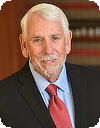

 January 2017
January 2017 September 2016
September 2016 January 2015
January 2015








 In 2020, I had the pleasure to organize an Advanced Collaborative Training with Woody Mosten for the Utah Association of Collaborative Professionals. Since that training, the amount of Collaborative Cases I have has at least tripled, and many other peacemakers in our Collaborative Group are reporting a similar surge in their Collaborative case load. Woody’s passion and hands-on teaching inspired every participant on the Zoom screen and has infused an energy in Utah that has helped us work on legislative and judicial changes to support and promote Collaborative Practice.
In 2020, I had the pleasure to organize an Advanced Collaborative Training with Woody Mosten for the Utah Association of Collaborative Professionals. Since that training, the amount of Collaborative Cases I have has at least tripled, and many other peacemakers in our Collaborative Group are reporting a similar surge in their Collaborative case load. Woody’s passion and hands-on teaching inspired every participant on the Zoom screen and has infused an energy in Utah that has helped us work on legislative and judicial changes to support and promote Collaborative Practice.